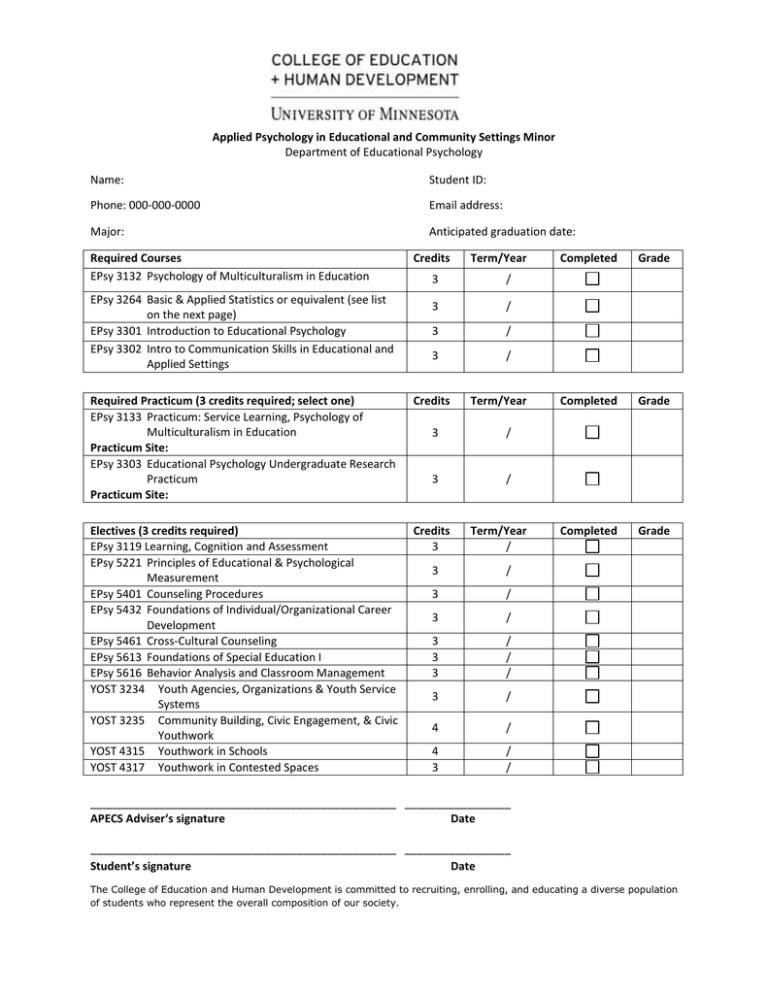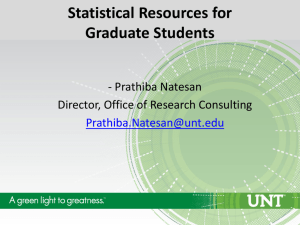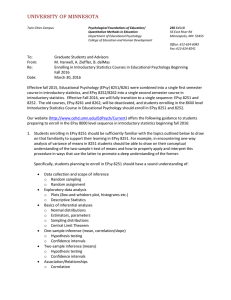Document 17907326
advertisement

Applied Psychology in Educational and Community Settings Minor Department of Educational Psychology Name: Student ID: Phone: 000-000-0000 Email address: Major: Anticipated graduation date: Required Courses EPsy 3132 Psychology of Multiculturalism in Education EPsy 3264 Basic & Applied Statistics or equivalent (see list on the next page) EPsy 3301 Introduction to Educational Psychology EPsy 3302 Intro to Communication Skills in Educational and Applied Settings Credits Term/Year 3 / 3 / 3 / 3 / Required Practicum (3 credits required; select one) EPsy 3133 Practicum: Service Learning, Psychology of Multiculturalism in Education Practicum Site: EPsy 3303 Educational Psychology Undergraduate Research Practicum Practicum Site: Credits Electives (3 credits required) EPsy 3119 Learning, Cognition and Assessment EPsy 5221 Principles of Educational & Psychological Measurement EPsy 5401 Counseling Procedures EPsy 5432 Foundations of Individual/Organizational Career Development EPsy 5461 Cross-Cultural Counseling EPsy 5613 Foundations of Special Education I EPsy 5616 Behavior Analysis and Classroom Management YOST 3234 Youth Agencies, Organizations & Youth Service Systems YOST 3235 Community Building, Civic Engagement, & Civic Youthwork YOST 4315 Youthwork in Schools YOST 4317 Youthwork in Contested Spaces Credits 3 Term/Year 3 / 3 / Term/Year / 3 / 3 / 3 / 3 3 3 / / / 3 / 4 / 4 3 / / Completed Grade Completed Grade Completed Grade _________________________________________________ _________________ APECS Adviser‘s signature Date _________________________________________________ _________________ Student’s signature Date The College of Education and Human Development is committed to recruiting, enrolling, and educating a diverse population of students who represent the overall composition of our society. This publication is available in alternate formats upon request. Please contact Lori Boucher, Department of Educational Psychology, 250B Education Sciences Building, 612 624 1698. Application Process 1. Complete the form on the previous page 2. Set up a meeting with the APECS program director, Dr. Rose Vukovic (PH: 612-626-7874 or EMAIL: rvukovic@umn.edu). 3. Once the form is signed by the APECS director, take the form to the College of Education and Human Development Student Services, 360 Educational Sciences Building. EPsy 3264 Equivalent Courses PSTL 1004 – Statistics: Understanding and Applying Data (MATH) (4.0 cr; Intermediate algebra or equiv or placement exam; No CLA students w/ 60+ credits credit will not be granted if credit received for: GC 1454 or Stat 1001) An introduction to statistics that emphasizes problem solving and decision making through the collection, analysis, and interpretation of data. Course topics: organization and presentation of data, summary statistics, sampling methodology, sampling distributions, probability, estimation, correlation, hypothesis testing, contingency tables, and chi-square analysis. PSY 3801 - Introduction to Psychological Measurement and Data Analysis (MATH) (4.0 cr; High school algebra, [PSY 1001 or equiv]; intended for students who plan to major in psychology) Descriptive/basic inferential statistics used in psychology. Measures of central tendency, variability, t tests, one-way ANOVA, correlation, regression, confidence intervals, effect sizes. Psychological measurement. Graphical data presentation. Statistical software. SOC 3811 - Basic Social Statistics (MATH) (4.0 cr; Prereq - intermediate algebra recommended, Soc 1001 recommended) This course will introduce sociology majors to basic statistical measures and procedures that are used to describe and analyze quantitative data in sociological research. The topics include (1) displays of frequency and percentage distributions, (2) measures of central tendency and dispersion, (3) measures of association and correlation, (4) bivariate regression, and (5) basics about probability and statistical inference. STAT 3011 - Introduction to Statistical Analysis (MATH) (4.0 cr; Credit will not be granted if credit has been received for: STAT 5021) This course provides an introduction to basic methods of statistics, including descriptive statistics, elementary probability ideas and random variables, distributions of sample averages. One and two sample t-procedures, simple linear regression, basic ANOVA. The target audience is undergraduates from all majors. Stat 3011 and Stat 3021 are both entry courses into the statistics curriculum for undergraduates.

